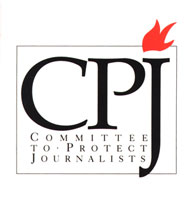NEW YORK: Outstanding journalists at the forefront of the battle for press freedom in Ethiopia, Iran, Russia, and Venezuela were honoured Tuesday evening, 23 November 2010, at the Committee to Protect Journalists' 20th Annual International Press Freedom Awards benefit dinner.
The event raised a record of nearly US$1.5 million for CPJ's work exposing press freedom violations, providing assistance to targeted journalists, and advocating for solutions to guarantee the right to independent and critical reporting.
Paying tribute to journalists
Celebrating at New York's Waldorf-Astoria, 900 guests paid tribute to the courage shown by Dawit Kebede (Awramba Times, Ethiopia), Nadira Isayeva (Chernovik, Russia), and Laureano Márquez (Tal Cual, Venezuela) in reporting the news and keeping citizens informed. A fourth award winner, Mohammad Davari, (Saham News, Iran), remains imprisoned in Iran for having reported on alleged rape, torture, and abuse at the now-closed Kahrizak Detention Centre. The Burton Benjamin Memorial Award, honoring a lifetime of work to advance press freedom, was presented to Aryeh Neier, president of the Open Society Institute.
"These journalists embody the struggle to report the news without fear of reprisal. Their work defies censorship," said CPJ executive director, Joel Simon. "Their courage is a shield for many journalists asking questions and exposing uncomfortable truths, even at personal risk."
The awards dinner was chaired by Sir Howard Stringer, chairman, CEO, and president of Sony Corporation, and hosted by CPJ advisory board member and former NBC Nightly News anchor Tom Brokaw, replacing current NBC anchor Brian Williams, who was originally scheduled to host the evening.
Advancing press freedom
With a view toward the future, Paul Steiger, CPJ chairman and editor-in-chief of ProPublica, reflected on strides made in advancing press freedom and outlined recurrent challenges that require the perseverance of organisations such as CPJ.
The awards to Márquez and Kebede were presented by Victor Navasky, chairman of the Columbia Journalism Review, and Robert Thomson, editor-in-chief of Dow Jones and managing editor of The Wall Street Journal. Isayeva's award was presented by author, journalist, and human rights defender Kati Marton. CPJ co-founder Michael Massing presented the award to Aryeh Neier. Christiane Amanpour, host of ABC News' This Week, introduced award winner Davari and urged dinner guests to sign a petition addressed to Ayatollah Sayed Ali Khamenei, as part of CPJ efforts to help release Davari. The petition will also be promoted online in the lead up to International Human Rights Day on 10 December.
J.S. Tissainayagam, a formerly imprisoned Sri Lankan journalist who was given a CPJ International Press Freedom Award in 2009, received his award in person on Tuesday, presented by Gwen Ifill, senior correspondent for The PBS NewsHour.
Documentary screened
The event included the premiere of a short documentary commemorating the anniversary of the massacre in Maguindanao province, Philippines, in which 57 people were ambushed in a shocking act of political violence. Thirty-two of those killed were journalists and media workers. CPJ is working with local journalist groups to advocate for justice, and is providing financial assistance to victims' families as part of its Global Campaign Against Impunity, which is supported by the John. S. and James L. Knight Foundation.
During his acceptance speech, Laureano Márquez pointed to the role of humor in conquering fear, saying, "Fear is not only a concern for citizens of countries enduring authoritarianism. Fear transcends borders and finds complicit silence in other countries and in international organisations that should speak up and take a position, but don't."
Dawit Kebede referred to the innate curiosity that led him to become a journalist and talked about the irony of a particular law in his native Ethiopia: "My country receives millions of American taxpayer dollars to fight terrorism in the Horn of Africa, but under our anti-terrorism law, I risk 25 years in prison if I interview certain opposition politicians."
Nadira Isayeva faces the possibility of eight years in prison but in addressing the audience, she spoke of what would be worse to her than jail: "What frightens me more is the possibility that some day in the future, a reader of my newspaper might say to me: 'When people were kidnapped, tortured, and executed without trial, you were silent.' "
Article published courtesy of CPJ















